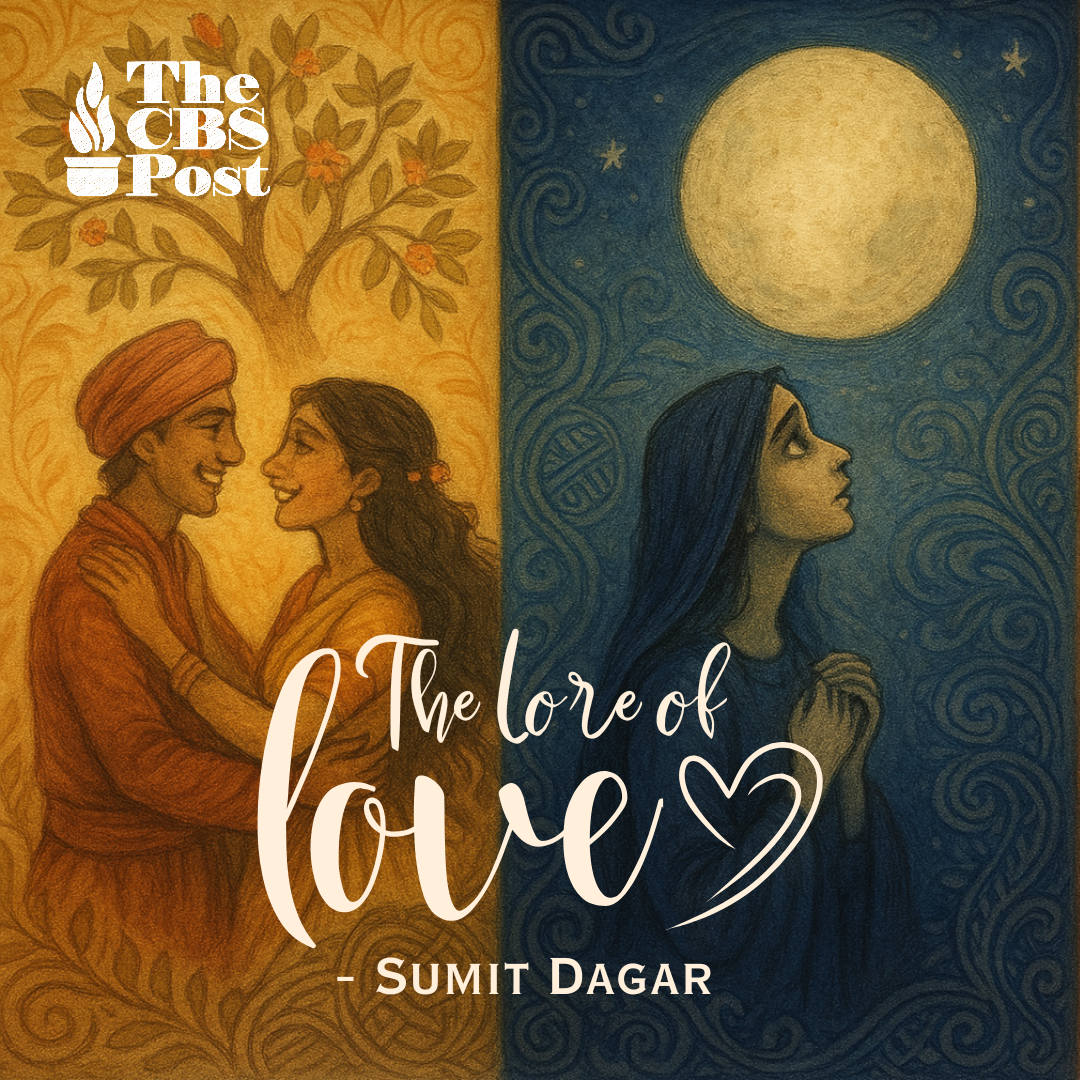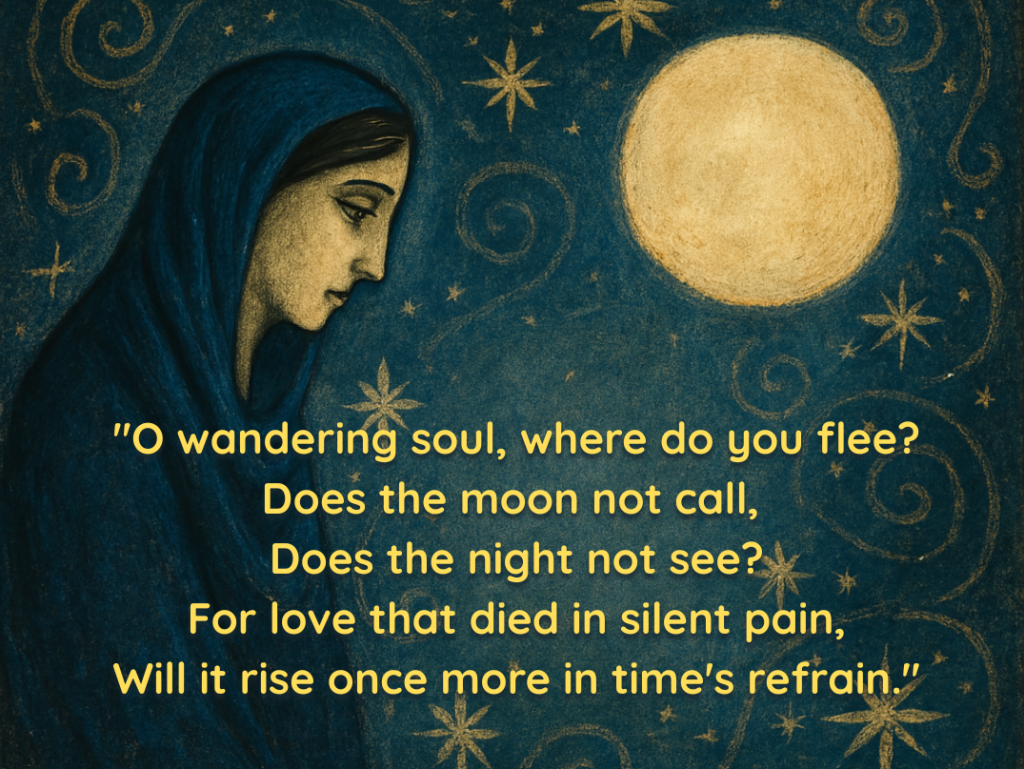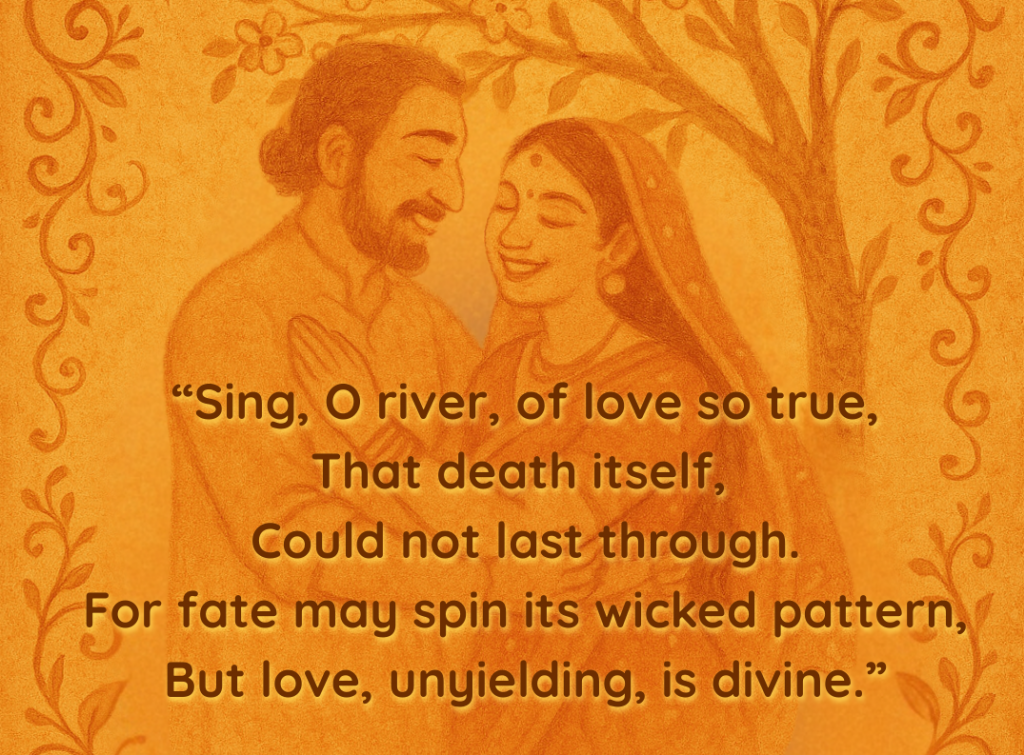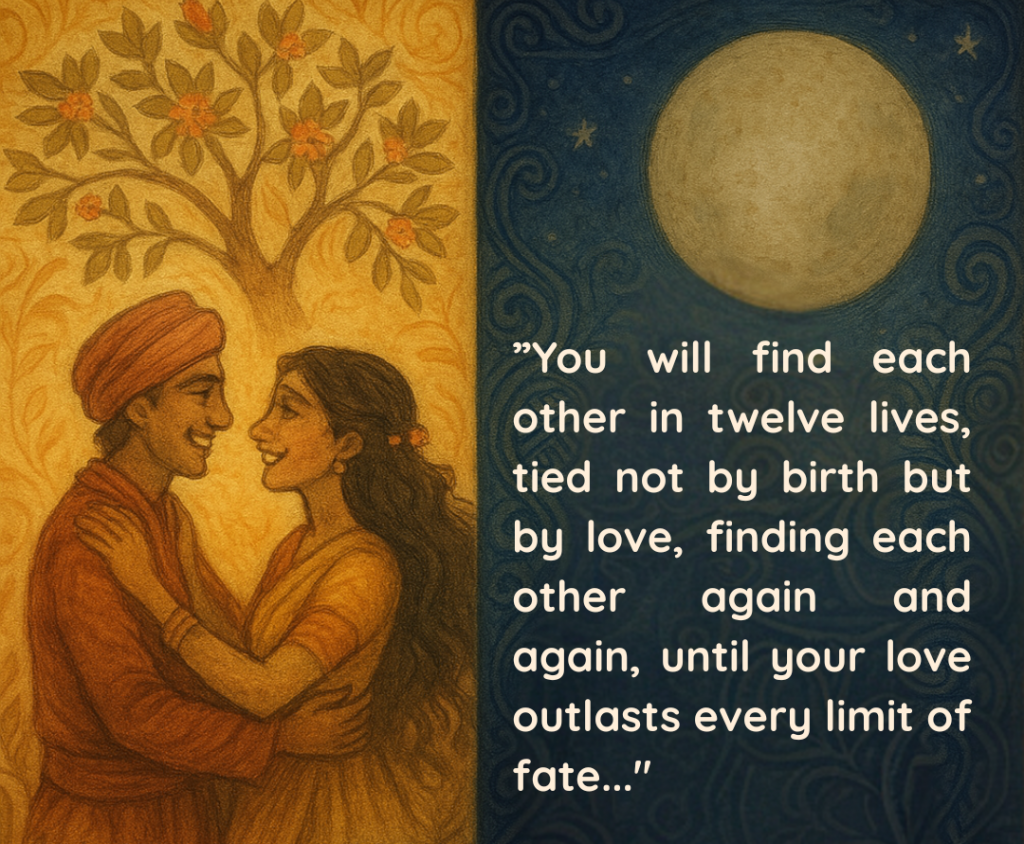The Lore of Love
By Sumit Dagar (BFIA’26)
Love, an endless flame that has burned across centuries, has worn countless forms in the hearts of both mortals and immortals. It rides the winds of the Himalayas, carves itself on the silent steps of Varanasi, and has made its mark on the forgotten ballads sung by peregrine minstrels. Love has been a blessing and a bane, a salvation and a damnation, an embrace and a sword. It has been murmured in moonlit palace corridors and cried for in the dark forests where restless spirits roam.
The tales of love that have made their way into folklore do not talk of plain wishes; they talk of the madness of love, the deewangi that makes one abandon the very laws of existence and fate itself. What is love if not rebellion? If not a quest to overcome the mortal limitations of flesh and bone? It is a thread woven out of dreams, tenuous but unconquerable, breaking empires and warping divinity in itself. After three explorative years in folklore, I have selected three stories of this revolution, that is love. These are not just stories. Shaped by oral storytelling of centuries, they are melodies of the lost, lyrics of the forsaken, and ballads of the forever past.
The first story starts deep in the dark woods of an unbeknownst land, where there resided the seven rakshasi sisters, its mystic guardians. Even their shadows on the ground were feared, dreaded by men and spoken of in shaken voices. Yet among these dark entities, there was one whose heart held an impossible love.
A great king reigned over a rich kingdom with seven sons, warlike and joyous hunters. Chasing a golden stag in emerald forests, one day, they ventured far into the domain of the rakshasis. When the golden stag disappeared, the seven monstrous sisters entrapped them. Every prince was taken, condemned to twenty-seven nights of desire before being consumed on the night of the full moon. But the youngest rakshasi, unlike her sisters, did not feel hunger, but tenderness. On the 26th night, her prince lay in her arms, oblivious to his impending doom, while she cried, singing lullabies of forbidden love. And when her tears fell upon his skin, he knew she was not like the others.
“They’ll feast upon you tomorrow,” she whispered. “You must escape.” The prince’s eyes asked in desperation,”Is there no escape?”
“At dawn, I will open the back door. Take the seven horses in the stable. Tell your brothers and ride away.” And ride away they did, slipping into the stable at first light, as the rakshasis roamed wild. Their victory, however, was short-lived. The rakshasis arrived early, quacking in fury, just as the prince made haste. Their hands wrapped around the horse’s tail, anchoring it down, and the prince’s heart plummeted.
“O sister! Take heed! Don’t let him cut the tail.” the youngest rakshasi shrieked, hiding a message in her warning. The prince, understanding, cuts off the horse’s tail, and his brothers did the same, getting away beyond the accursed land. Bound by unseen shackles, the rakshasis stood at the edge of their kingdom, unable to cross. their fury burned like an unquenched fire. The eldest rakshasi bellowed, her voice shaking the trees, “Tell us, who helped you escape?” And in that moment, the youngest prince, without hesitation, uttered the name of the one who loved him most.
Her sisters’ anger turned against her, claws ripping into the flesh that had dared to want love. As her own blood stained the ground, she gazed at the prince a final time and smiled. Love, she knew, was not for the living.
But love, even in its destruction, remains after death. And so, as the final spark of her spirit burned into the sky, the river bore along a song, a dirge for an unfulfilled love. This story is often ended with the message, “Sometimes, true demons are not monstrous forms, but people with corrupt hearts for a demoness may love without condition, but a man may possess a soul blacker than hers.”
For women, love has always been more than just a mere affection. From Sati, Parvati, Sita, Radha, to Rukmini, it’s been a force, a destiny, and most importantly a trust worth fighting for Whether it means fighting the heavens, their own nature, or the cruelty of time. While recalling stories of such women, there is one more, worth mentioning. Behula, a name barely talked about.
In ancient times, in the heavens’ courts, Usha, daughter of Daitya king Banasura, and Aniruddha, grandson of Krishna, dared to love against the gods and hence were exiled to the earthly realm. They were reincarnated as Behula and Lakshindar. Chand Sadagar, the mighty merchant of Champaknagar, rejected the dominion of Devi Manasa, the goddess of serpents. Enraged, she placed a curse on his family, causing six of his sons to die from snake bites. Yet Chand vowed never to surrender.
“Let rivers rise and heavens fall, I bow to none but Mahadev, divine of them all.”
When Lakshindar, his seventh son, was born, seers predicted doom. Only Behula, Saybene’s daughter, was fated to save him as she had the boon of a long life with her husband. Their wedding night witnessed the construction of an iron palace, locked with prayers. However, through Vishwakarma’s cunning deceit, Manasa left an invisible hole. Kalnagini, the black serpent, slipped in, striking as moonlight shone upon the lovers. With Manasa’s will, death claimed Lakshindar . But despair did not shatter Behula. She set his dead form on a raft, allowing the river to navigate her through fields of wisdom and sorrow, across seers and abandoned lands. For six full moons, she floated, unfazed.
The raft reached the shore of Neta, the elder sister of Manasa, who, sympathizing with Behula’s love, took her to the heavens. There, the gods, impressed by her love, offered her an alternative: Lakshindar’s life in return for Chand Sadagar’s surrender to Manasa.
Going back, Behula confronted her father-in-law, the weight of heaven in her entreaty. Chand, proud and obstinate, noticed the spark in her eyes, love that had revolted even fate. Filled with pride and submission, he went down on his knees, not in surrender, but in awe of a power greater than pride.
With his left hand, he offered anjali to Manasa. Life coursed through Lakshindar’s blood. The river sang, the winds heavy with words, and even the gods were amazed, for love had done what the heavens could not, love had vanquished fate.
And then comes the third story, a love so great that it can carry the weight of a hundred lives, breaking the wheel of birth and death like the first ray of sunlight breaking an endless night. An unknown journey upon which two travellers embarked, no light, no path, only a fading essence that refuses to be forgotten. It is a love not merely tested but tortured, where the heart is a pilgrim forever barred from its shrine. No book writes it down, no pen ever claimed it. And yet, from the lips of village elders to the songs of minstrels traveling across the land, this legend has flowed like a river. The legend of Saranga and Sadabrij is not written in gold-embossed tomes, but is transmitted by word of mouth, passed from wrinkled hands to curious hearts.
Long before they were Saranga and Sadabrij, they were Devdatta, a pious Brahmin, and Kamalavati, his devoted wife. They loved each other with all their hearts, but were childless. They prayed to Lord Shiva with unwavering devotion, giving him everything they possessed. One night, a passing saint arrived, his eyes aglow with old wisdom. Touched by their generosity, he blessed them with a boon.
That evening, they died, but their quest was only beginning.
Reincarnated, they loved again, but caste parted them. Banned from each other’s embrace, they chose death over being torn asunder. They undermined the gift of life, raising the ire of the gods. They were returned, not as humans, but brute, monkeys huddling together during storms, until death took one from the treacherous grasp of a river. In agony, the other died, but love never dies. It evolves, it waits.
In his third incarnation, he was Suryabhan, the beloved son of a noble merchant, and she, Chitrangada, an apsara from Indra’s court, her beauty woven from moonbeams and music. Apsaras were made for the heavens, but Chitrangada roamed the world, looking for something she could not name, a face, a voice, a presence she had known before time had given it a form. One evening, she stumbled upon him beneath a blooming tree. The first sight, their souls recognized each other. “Your breath is sandal’s air, your lips are like a lotus rare,” he whispered. Love developed, but the gods had set her destiny. Indra would not let go, what was his.
Chitrangada must go back, but she could not leave Suryabhan behind. “There is a way,” she breathed, turning him into a golden bumblebee, hiding him within her clothes as she ascended to the Indra’s court. But with each dance, he came alive. Indra’s keen eye rested upon her. “What do you hide?” he boomed. Holy water drenched her, and where the bee rested, now stood a dazed man. Gasps were heard in the durbar. A human in the domain of gods, a sin beyond pardon.
Indra’s anger seethed. “Foolish mortal! Do you suppose love can overcome the will of the universe? For your temerity, you will have to suffer my curse.” Chitrangada begged, but Indra was furious. “For your disobedience, you will be born three times not as lovers, but as a beasts and birds. Only then will you be born again as human beings.”
And so, love and longing began their endless cycle, defying fate, bound across lifetimes, waiting for the day the curse would lift, and they would find each other once more. By Indra’s decree, divine power struck them down. Heaven trembled as Chitrangada and Suryabhan fell, spinning through the mortal realm, their bodies shattering upon the earth. Their souls wandered through three lifetimes, love pulling them together, only for fate to wrench them apart.
Each time, the world denied them. Bound by caste, by duty, by destiny, their love was deemed blasphemy. They perished at the hands of those they cherished. As animals, they howled and searched; as birds, they sang sorrowful songs; as beasts, they roamed the earth in restless longing. With every rebirth, love remained just out of reach, slipping like grains of sand through time’s cruel grasp. But true love is defiant, an ember that refuses to fade.
“In their final birth, a vow was sealed, if they found each other again, nothing would part them.”
Under the crimson sky of Ambavati, a son was born to king Jagdish and Queen Jayanti. Lavish feasts, saffron-scented winds, and joyous melodies filled the palace halls. The elder priest raised his hand, his voice echoing with prophecy:
“I name him Sadabrij. A prince, a wanderer, a man unchained, Love’s sweet poison through his veins. An Apsara’s shade will haunt his sight. He may leave the luxuries to keep the dream of love, ending in a hermit’s fate, Will weave a story of loss, and wait.”
Far from the palace, in a merchant’s home, Padmavati and Padumshah rejoiced at their daughter’s birth. She arrived like the promise of spring, delicate as jasmine. Another priest, draped in saffron, foretold:
“Saranga, Saranga, of heavenly grace, An Apsara’s heart in mortal chest, Her love that fate shall put to a final test.”
Years unfurled, and destiny guided Sadabrij and Saranga toward each other. In the hush of their school, they met and an unspoken recognition crackled in the air. “I cannot look away,” Sadabrij murmured. “Who are you? Why do I long to see you?” Saranga’s voice was soft as falling rain. “I feel the same. Only with you, I am at peace.”
They found solace beneath the old banyan, love growing in whispers and stolen glances. But eyes watched, tongues whispered, and soon, fate intervened. Their love became a scandal.
Saranga’s father decreed she would marry within her caste. Desperate, she pleaded with her mother.
But pleas of love alone could not defy the world’s iron walls. And so, the story of Sadabrij and Saranga began once more. Far from all this, Sadabrij was banished to Manikpur, a conspiracy hatched by Padumshah and King Jagdish to cut him off from Saranga. With Saranga’s marriage with Madhukar was settled, her heart dried up in despondency. Her father’s palace became a resplendent display of celebration, but behind the glitter, Saranga, dressed in bridal red, cried alone.
Exiled, Sadabrij trusted Veersen, his friend. “I shouldn’t let her go,” he pledged. Veersen, always the tactician, had a plan. Pretending to be traveling magicians, they snuck into the wedding. When the groom rode in procession, Sadabrij incorporated a riddle into his act, a hidden summons to Saranga. She identified him immediately, their communication hidden in verse:
“The flower has bloomed, yet the gardener has forsaken it.”
“Have faith in your gardener’s toil, my love, For he will defend his flower, through fire and soil.”
With astuteness, Sadabrij deceived the priest into blessing his sword with sindoor, whereupon Saranga secretly imprinted her forehead with the same, proclaiming herself married to him. Later, she fled to the temple of Kali, where he had been waiting for her. “You are my husband,” she breathed. “Escape with me.” They agreed to meet at a secret Shiva temple across the river on the same way where her baraat was to pass. Dawn discovered Saranga waiting, but Sadabrij, exhausted by the efforts of the previous night, slept under a banyan tree. Desperate, she wrote a message in blood on a leaf and sent it with a parrot. When he woke up to find her missing, his love turned to insanity. Determined, and burning in a longing fire, he went to the nearby Shamshan. He bathed in cremation ashes, wore a saffron cloak, and with a trident in his hand, set out to retrieve her. Singing madly the lullabies of their love, he passed towns, forests, rivers and mountains witnessing the pain in his words, carrying the tragedies of previous lives.
Disguised as an ascetic, he reached Dhara Nagar. Saranga, recognizing him, devised a plan. That night, she lay still with a lifeless cobra upon her chest. At dawn, her family, believing her dead, bore her to the riverbank for cremation. As the pyre was lit, a ghastly apparition emerged; Sadabrij, cloaked in spectral horror. The mourners fled in terror, abandoning Saranga’s bier. She rose, unscathed, and together, they vanished into the jungle.
In lifetimes of yearning, tests, and sacrifices, they had overcome destiny. Far into the forest, they discovered the ascetic who had blessed them in their first lives.
The ascetic opened his eyes, brimming with the richness of the ages, and smiled kindly. “You have come back, my children,” he said. “The road you traveled was long, but the substance of your being has not changed, like the endless river that flows, bearing with it the memories of the mountains it once kissed.” And so, when the ascetic blessed them for the last time, a peaceful calm descended on their souls. The cycle of life, death, and rebirth had finally run its course, and in that still, holy place, they were given eternal oneness.
Saranga and Sadabrij lived happily ever after, and it was evident that love, bravery, and determination could conquer any obstacle.
The story of Sadabrij and Saranga is one such epic where love is neither submissive nor dominant, but an indomitable storm, a divine mandate that neither death nor fate can tear asunder. Theirs is a tale of love that spans lifetimes, a love tempered in the fire of challenges and misfortunes, where distance only strengthens the soul’s determination to meet again.
Looking back to the tale of Behula, whose passion was no less all consuming, we glimpse the different face of this power. Behula, in similar fashion to Saranga, is confronted by the loss of her love, only to overcome death itself through sheer determination and absolute devotion. Her passion is one of sacrifice, a woman prepared to endure the very ire of the gods in order to restore her lost love.
The story of Rakshasi provides a darker meaning. Here, love is a curse; a risky, nearly parasitic feeling that subsists on the frailty of the innocent spirit. The Rakshasi, with her vengeful love, personifies how this energy can twist and ruin instead of heal and enlighten.
In all these stories, love is not a simple emotion, but a storm, feral, suffocating, and with the potential to save and destroy. Folk lore, in its age-old sense, reminds us that love is not always kind; it is a power that can construct and deconstruct, save and destroy, in accordance with the soul that carries it.
This is the lore of love.








Comments